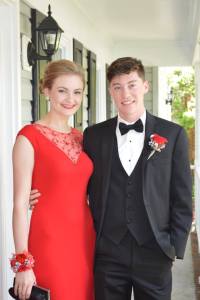When John Shevis, FCRH ’19, speaks, he does so with a clear, confident voice. It is as if he knows exactly what he wants to say and how to say it. He doesn’t stutter or fumble over his words; he just says them.
“I was kind of a softer speaker in the beginning of college, and in ROTC we’d have to get up in front of everybody and talk, and there just is no room to be uncomfortable in ROTC,” he says. “You have just gotta get up there and say what you need to say.”
Shevis was born in Monterey, California, but moved to Chesapeake, Virginia when he was seven years old. His home town is not far from Norfolk, the city with the largest naval base on the East Coast.
In addition to the influence of the close proximity to Norfolk, Shevis’ father also served as a Marine. He says that he was always pretty certain that he wanted to be involved in some aspect of the military “I am not sure exactly what my place will be in the Army after college, but I know I will be happy being there.”
Balancing standard extracurricular activities and academics is always hard, but ROTC requires even more commitment from its students. “In addition to the standard course load, we have physical training three times a week, a three hour ROTC class once a week, and other responsibilities such as color guard.”
The ROTC class teaches each student leadership skills that they will need in order to be successful in the military and, according to Shevis, life in general. “These aren’t just skills that will help me in the Army. These are things that will help me in every part of my life. It is about learning how to be responsible and how to have good time management skills. Those will help you everywhere you go.”
Shevis says they also teach military tactics, but that the majority of that military-specific learning won’t come until junior year. “Right now, it’s mostly about gaining valuable critical thinking skills.”
He will serve five years in the military after college, which is required of ROTC students, but he, like many of us, is not entirely sure what he is going to do with his life. “I want to study political science here, but I don’t really know what exactly I want to do for a living. I’ve always had this idea of being a politician, but I’m not really sure. Though military experience would definitely help me with that.”
When I ask him if he thinks political science will help him in the military, he responds, “Of course. The military is becoming a huge political issue, and understanding the specifics of world policy will help me be able to put it in context…We need to be able to follow orders, but we also need to understand why certain decisions are being made.”
Shevis says that what attracted him to Fordham was its ROTC program, excellent academic standing and especially its proximity to the city. “So far, I love New York. There is always something to do or somewhere to visit. It is a little cold, but I am getting used to it.”





